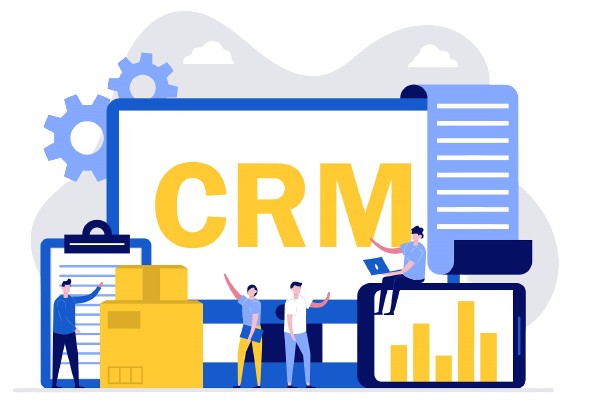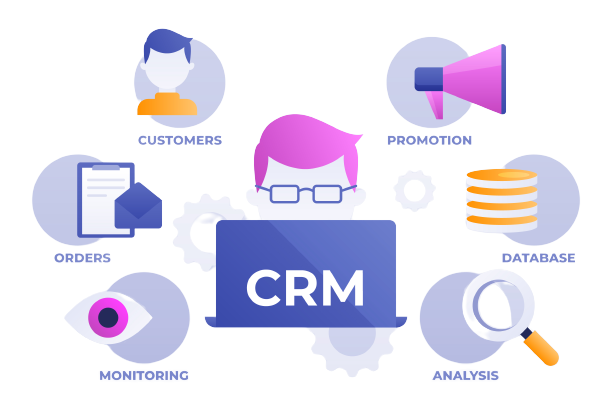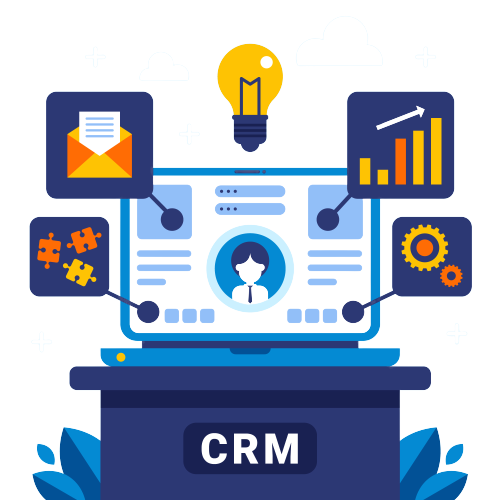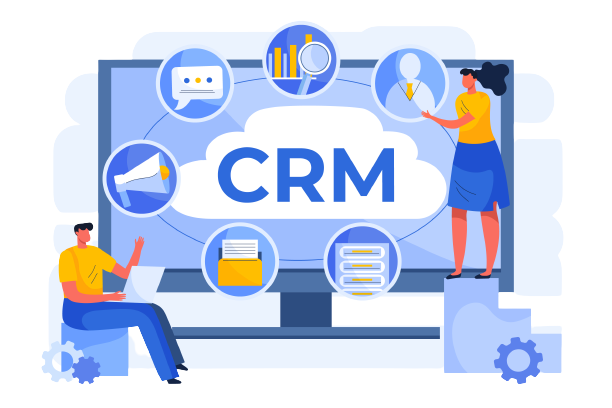
Your business is flourishing, gaining new customers by the day, and your team is firing on all cylinders. But with this rapid growth, you’re encountering some unique challenges. Your current CRM software for small business, which used to work like a charm, now seems to be struggling to keep up. That’s where scalability becomes the magic word!
So, in this blog, we’ll be your guide through the captivating world of scalable CRM software. We’ll be exploring the top 5 features that set these systems apart and make them instrumental in propelling your business to new heights.
You see, as businesses grow, their needs evolve. What worked for a small startup might not cut it anymore when you’re expanding into new markets and serving a more extensive customer base. Best CRM software for small business with scalability is like a trusty companion that grows and evolves with you, ensuring your business can handle anything that comes its way.
But it’s not just about being able to handle growth. The secret sauce lies in the top 5 features that these cutting-edge CRM solutions offer. These features are designed to boost efficiency, foster data-driven decisions, provide a holistic view of your customers, seamlessly integrate with other tools, and elevate personalization like never before.
If you’re new to CRM software or unsure about the implementation process, we’ve got you covered! We’ll share expert insights and best practices for adopting and leveraging a scalable CRM solution in a way that aligns perfectly with your business needs.
So, whether you’re a startup looking to expand or an established company seeking that extra push, our blog is a one-stop destination for all things scalable CRM and business growth. Let’s get on this adventure together and unlock the secrets to success in the fast-paced world of modern business! Let’s go!
How a Flexible & Best CRM Software Supports Your Growing Business?

As a business owner or manager, you’re well aware of the constant evolution and growth your company undergoes. Whether you’re a startup gaining traction or an established enterprise expanding into new territories, managing this growth effectively becomes critical to your success. This is where scalability comes into play, and in the realm of CRM software tools, it becomes an absolute revolutionary.
Understanding Scalability in CRM Software
In simple terms, scalability refers to the ability of a system or software to adapt and accommodate increased demand or workloads without sacrificing performance or stability. When it comes to CRM software, this means having a solution that can grow alongside your business and continue to meet your evolving needs seamlessly.
A scalable CRM software is built with the foresight that businesses will progress and expand over time. It’s designed to handle larger data volumes, an influx of new customers, and additional user accounts without becoming sluggish or unreliable. As your company grows, you don’t want to find yourself hitting a roadblock where your CRM software can no longer keep up. Scalable CRM offers the assurance that your operations can scale up effortlessly, empowering you to focus on what truly matters—nurturing your customer relationships and driving business growth.
Benefits of Choosing a Scalable CRM Solution

- Future-Proof Your Business: Investing in a scalable CRM software is like building a solid foundation for your future success. It ensures that as your business expands, your CRM system will adapt accordingly, sparing you the headache of outgrowing your current solution and needing to migrate to a new platform later on.
- Cost-Effectiveness: While some businesses might be tempted to start with a basic CRM and switch to a more robust one as they grow, this approach can be costly and time-consuming. Opting for a scalable CRM from the beginning can save you from the hassle of data migration, employee retraining, and potential disruptions to your operations.
- Enhanced Performance: A scalable CRM is designed to handle an increasing number of users and processes without compromising performance. This ensures that your team can continue working efficiently, even during periods of rapid growth.
- Flexibility and Customization: As your business expands, your CRM needs might evolve too. Scalable CRM solutions typically offer a higher degree of customization, allowing you to tailor the system to suit your unique requirements as you grow and diversify your offerings.
- Seamless Integrations: Businesses often rely on various tools and systems to streamline their operations. A scalable CRM software can seamlessly integrate with other business applications, enabling a smooth flow of data and information across different platforms.
Embracing Growth with Scalable CRM Software
The process of implementing scalable CRM software is an opportunity to future-proof your business and set the stage for continued success. Here are some steps to ensure a smooth and effective transition:
- Assess Your Business Needs: Understand your current CRM requirements and identify the potential areas where your business might expand in the future. This will help you choose a scalable CRM solution that aligns with your growth vision.
- Choose the Right Vendor: Selecting the right CRM vendor is crucial. Look for a provider with a proven track record in offering scalable solutions, and check for customer reviews and testimonials to gauge their performance.
- Plan for Training and Adoption: Introducing a new CRM system requires proper training and onboarding for your team. Ensure that your employees are well-prepared to make the most of the new software and embrace the changes positively.
- Monitor and Adjust: Regularly evaluate how your CRM system is performing and adjust its configuration as your business evolves. Scalability means being agile and adaptable, so be ready to make tweaks when needed.
Thus, it can be said that scalability is more than just a buzzword; it’s a key ingredient in the recipe for long-term business success. Flexible and scalable CRM software tools empower your growing business to handle increasing demands, maintain exceptional customer relationships, and make data-driven decisions.
How a Scalable CRM Software Helps You Accommodate Growth?

As your business gains momentum and expands, you face new challenges and opportunities. One of the most critical aspects of managing growth effectively is having the right tools and systems in place to support it. This is where scalable CRM software for small business comes into play as a powerful ally in accommodating your business’s growth.
1. Seamlessly Handle Increasing Data Volume:
With growth comes an influx of data – customer information, sales records, marketing insights, and more. A traditional CRM system might struggle to handle the sheer volume of data generated by a rapidly expanding business. However, scalable CRM software is purpose-built to handle larger data volumes with ease. It can efficiently process and store vast amounts of information, ensuring that you can continue to capture, analyze, and leverage data without any performance hiccups.
2. Scaling User Access and Licenses:
As your team grows, so does the need for more users to access and utilize the CRM system. With scalable CRM software, adding new users or licenses becomes a simple process. You won’t have to worry about hitting user limits or incurring additional costs for every new team member. The system grows alongside your organization, granting access to those who need it without any hassle.
3. Enhanced Performance during Peak Demands:
In the world of business, there are times when demand skyrockets – a product launch, a seasonal promotion, or a surge in customer inquiries. During these peak periods, your CRM needs to be at its best to handle the increased workload. Scalable CRM solutions are designed to maintain peak performance even during times of high demand. This means your team can continue to work efficiently and serve your customers without any slowdowns or system crashes.
4. Adapting to Business Process Changes:
As your business evolves, so do your processes and workflows. A scalable CRM software for small business allows you to customize and adapt the system to align with your changing business needs. Whether you’re restructuring departments, introducing new sales strategies, or refining customer support procedures, a scalable CRM can accommodate these changes without requiring a complete overhaul.
5. Geographical Expansion Made Simple:
Expanding your business to new regions or countries brings a new set of challenges, including varied regulations, customer preferences, and languages. A scalable CRM software can support multi-location operations effortlessly. It can cater to different teams working in various time zones and adapt to regional-specific requirements, ensuring a seamless transition into new markets.
6. Integrations for Streamlined Operations:
Growing businesses often rely on a suite of tools to streamline their operations. A scalable CRM software is designed to integrate smoothly with other business applications such as marketing automation tools, e-commerce platforms, and analytics software. This integration provides a holistic view of your business data and enables efficient data sharing across platforms, eliminating the need for manual data entry and reducing the risk of errors.
A scalable CRM software for small business is not just an option; it’s a necessity for businesses looking to thrive in a dynamic and competitive marketplace. As you embark on your journey towards expansion, consider investing in scalable CRM software to ensure that you have a robust and flexible foundation to accommodate growth and take your business to new heights of success.
Top 5 Features that Drive Business Growth in CRM Software

Beyond just managing contacts and interactions, modern CRM solutions offer a plethora of features that can significantly impact a company’s growth and success. Let’s explore the top five features that drive business growth in CRM software and how they can revolutionize your approach to customer relationships and revenue generation.
1. Boosting Efficiency: CRM Automation
Time is a valuable resource in business, and CRM automation is a game-changer when it comes to optimizing productivity. Manual data entry, repetitive tasks, and mundane processes can drain your team’s energy and limit their ability to focus on critical tasks. CRM software for small business with automation feature streamlines these processes, enabling your team to work smarter, not harder.
By automating data capture, lead assignment, follow-up reminders, and email campaigns, your team can dedicate more time to nurturing relationships and closing deals. This newfound efficiency translates to faster response times, improved customer satisfaction, and increased sales opportunities, all of which are fundamental drivers of business growth.
2. Data-Driven Decisions: Advanced Analytics
In the digital age, data is king, and CRM software is a goldmine of customer insights. Advanced analytics tools within CRM systems empower businesses to harness this data effectively. Analyzing customer behavior, purchase patterns, and engagement metrics allows you to make data-driven decisions and tailor your marketing and sales strategies accordingly.
Identifying trends, recognizing high-value customer segments, and uncovering upselling opportunities are just some of the benefits of leveraging CRM analytics. Armed with this knowledge, you can optimize your offerings, target the right audiences, and fine-tune your marketing efforts, ultimately leading to higher conversion rates and increased revenue.
3. Seamless Integration: Connecting CRM with Other Business Tools
A standalone CRM system is powerful, but its true potential is realized when it seamlessly integrates with other tools in your tech stack. Whether it’s marketing automation platforms, e-commerce systems, or helpdesk software, integration ensures a unified and synchronized flow of data across your business.
Integrating CRM software for small business with other tools enhances cross-department collaboration, creates a 360-degree view of customer interactions, and facilitates more personalized experiences. This integrated ecosystem nurtures a cohesive customer journey, enhancing customer satisfaction and loyalty, thereby driving business growth.
4. Customer-Centricity: A 360 View of Customers
Understanding your customers inside out is vital for driving business growth, and this is where the 360-degree view comes into play. A CRM system that provides a comprehensive view of each customer, including their contact information, purchase history, communication preferences, and support interactions, empowers your team to deliver personalized experiences.
Personalization builds trust and fosters stronger customer relationships, increasing customer retention and driving word-of-mouth referrals. With a 360 view of customers, your team can identify upselling and cross-selling opportunities, proactively address customer needs, and ultimately boost customer lifetime value.
5. Scaling Personalization: AI and Machine Learning
Artificial Intelligence (AI) and Machine Learning (ML) are revolutionizing CRM by taking personalization to new heights. AI-driven CRM software can analyze vast amounts of customer data to predict behavior, identify buying patterns, and anticipate customer needs.
By leveraging AI-driven insights, you can send targeted product recommendations, tailor marketing messages, and deliver personalized content to each customer. The result is a highly engaging and tailored experience that resonates with customers on an individual level, driving higher conversion rates and fostering brand loyalty.
Incorporating these top five features into your CRM software unlocks the potential for unprecedented business growth. By utilizing these features, businesses can elevate their customer relationship management, increase customer satisfaction, drive more sales, and boost overall revenue. Investing in the best CRM software for small business, with these growth-oriented features is not just an expense; it’s an investment in the future success and prosperity of your business.
Implementing Scalable CRM Software for Business Growth

As your company expands and evolves, having a scalable CRM system becomes essential to support your increasing demands and accommodate future growth. But implementing scalable CRM software requires careful planning and execution. Let’s get into the steps and best practices to successfully implement a scalable CRM solution for business growth.
1. Assess Your Business Needs
Before diving into any CRM implementation, it’s crucial to conduct a thorough assessment of your business needs. Identify the pain points in your current CRM or manual processes and determine what functionalities are essential to support your growth objectives.
Involve key stakeholders from various departments to gather their input on the features they require and the challenges they face. Understanding your business requirements thoroughly will help you choose the most suitable scalable CRM software that aligns with your growth vision.
2. Select the Right CRM Vendor
Choosing the right CRM vendor is a critical decision that can significantly impact the success of your implementation. Look for a vendor with a proven track record in offering scalable solutions and supporting businesses through their growth journey.
Consider factors such as the vendor’s reputation, customer reviews, scalability of their existing clients, and the level of support they offer during implementation and beyond. A reliable CRM vendor will act as a partner in your business growth and provide the necessary guidance and resources to make the most of your CRM investment.
3. Plan for Training and Adoption
Introducing a new CRM system to your team requires proper training and onboarding to ensure smooth adoption. Employees need to understand how the new CRM will enhance their workflows and benefit their daily tasks. Provide comprehensive training sessions tailored to different user roles and offer ongoing support to address any questions or concerns that arise during the implementation process.
Encourage early adoption by identifying CRM champions within your organization who can advocate for the system and help others embrace the change positively. A successful CRM implementation hinges on your team’s willingness to embrace the new technology and leverage its capabilities effectively.
4. Customize for Success
One of the advantages of scalable CRM software for small businesses is the flexibility it offers in customization. Tailor the CRM system to fit your unique business processes and requirements. This might involve creating custom fields, workflows, or reports that align with your specific needs.
Collaborate with your CRM vendor or an experienced CRM consultant to ensure that the system is configured to support your business growth plans. Avoid the temptation to overcomplicate the system with unnecessary customizations; instead, focus on streamlining processes and enhancing productivity.
5. Data Migration and Integration
If you’re transitioning from an existing CRM or other data systems, ensure a smooth data migration process. Data accuracy and integrity are vital for a successful CRM implementation. Work with your CRM vendor to map out the data migration plan, validate data quality, and conduct comprehensive testing to avoid any data discrepancies.
Integrate the new CRM software with other business applications in your tech stack to create a unified ecosystem. Seamless data exchange between different tools enhances efficiency and provides a holistic view of customer interactions across departments.
6. Monitor and Adjust
A successful CRM implementation doesn’t end with go-live; it’s an ongoing process. Continuously monitor the system’s performance and gather feedback from your team to identify areas for improvement. Listen to user suggestions and make adjustments to the CRM system as needed.
Stay updated on the latest CRM trends and features that could further enhance your business growth efforts. A scalable CRM software should be agile and adaptable to meet your evolving needs as your business expands.
Wrapping Up By Setting Your Business Up for Success with Scalable CRM
A scalable CRM software with the top five features is undeniably the driving force behind unparalleled business growth. From streamlining operations through CRM automation to making data-driven decisions with advanced analytics, this technology empowers businesses to optimize efficiency, enhance customer experiences, and foster sustainable growth.
The seamless integration with other tools, coupled with a 360-degree view of customers, takes customer-centricity to new heights, ensuring businesses can adapt and thrive as they expand into new markets. Embracing AI-driven personalization opens up a world of possibilities, allowing organizations to forge deeper connections with customers, increase brand loyalty, and ultimately achieve remarkable success.
Investing in a scalable CRM solution equipped with these top five features is not just a choice; it’s a strategic decision that paves the way for a prosperous future in a competitive landscape. So, seize the opportunity, embrace the power of scalable CRM, and watch your business soar to unprecedented heights, leaving a trail of satisfied customers and achieving new milestones along the way.